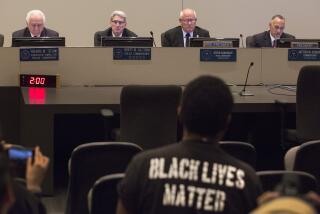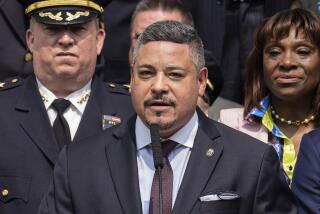Leader of 9/11 Probe Resigns Suddenly
WASHINGTON â A congressional investigation of the intelligence failures surrounding the Sept. 11 terrorist attacks has been thrown off course by the sudden resignation of a former CIA official hired to lead the inquiry but criticized for being too cozy with his former employer.
L. Britt Snider, former inspector general at the CIA, resigned under pressure Friday, less than three months into a high-stakes probe designed to determine why the nationâs spy agencies failed to pick up any warning of the attacks on the World Trade Center and Pentagon.
Sniderâs departure derails the inquiry at a time when investigators are already poring over piles of intelligence agency documents and planning a heavy summer schedule of congressional hearings. Sniderâs resignation throws that schedule into doubt and could be followed by additional departures, congressional sources said.
Ranking members of the House and Senate Intelligence committees declined to comment on Sniderâs resignation, citing the confidentiality of personnel matters. Snider did not return calls to his Virginia residence. Word of his departure did not circulate through Washington until Monday.
But congressional sources confirmed that Snider, 57, was forced out amid growing concerns with his management of the investigation ranging from the tone of his leadership to his personnel decisions.
Several sources said Sniderâs resignation was sparked by troubling questions that surfaced in recent weeks about whether one or more of his hires lacked clearances to view classified material.
There were also complaints about Sniderâs perceived reluctance to cause trouble for his former colleagues at the CIA. One aide cited âconcerns over whether or not he had the aggressiveness to get this thing done.â
Several Republicans had expressed such reservations about Snider before he was hired. But sources said their concern came to be shared more recently by Sen. Bob Graham (D-Fla.), chairman of the Senate Intelligence Committee, who had been Sniderâs key backer.
Several members expressed hope that disruption caused by Sniderâs departure would be minimal. âIf the rest of the staff stays intact and they get a good leader to take over, it might not slow it down too much,â said Sen. Jon Kyl (R-Ariz.). âIâm not particularly concerned that this is going to be a big issue.â
For the moment, at least, Sniderâs top deputy, Rick Cinquegrana, has been tapped to lead the investigation. Cinquegrana is also an agency veteran, having worked under Snider as head of inspections at the CIAâs inspector generalâs office. It was not clear whether Cinquegrana is seen as a potential permanent replacement.
Criticism of Snider was not unanimous, and some committee members voiced disappointment that his services had been lost.
âBritt is a fine man,â said Rep. Jane Harman (D-Venice), a member of the House Select Committee on Intelligence. âI have high regard for him and believe he could have directed a very impressive project.â
In some ways, Sniderâs brief tenure underscores the politically treacherous nature of the committeeâs task. Even among the four ranking members of the House and Senate committees, there is tension over how aggressively to pursue the inquiry.
Members agree the public deserves straight answers about intelligence failures, but are at odds over whether the inquiry should seek to place direct blame at a time when few in Washington are eager to be seen as unpatriotic.
âMembers are trying to say, âWeâve got to get to the bottom of what happenedâ while also saying, âWe donât want to make it into a witch hunt,â â said former U.S. diplomat L. Paul Bremmer, who led a previous probe of intelligence agencies after the bombing of U.S. embassies in East Africa. Those conflicting impulses, Bremmer said, âwill be an inherent tension irrespective of who is the staff director.â
Snider retired last year as CIA inspector general. He was introduced as staff director on Feb. 14 as members of the House and Senate Intelligence committees announced the creation of a joint panel to examine failures surrounding the attacks on the World Trade Center and Pentagon.
He had hired an investigative staff of 30, which has been gathering evidence and lining up interviews with officials at the CIA, FBI and other intelligence and law enforcement agencies.
The report, which members have said they hope to complete by yearâs end, could help shape the intelligence community for years to come. In fact, many in Washington see the investigation as equivalent to landmark probes launched after the Japanese attacked Pearl Harbor--an event that eventually led to the creation of the CIA itself.
Several GOP members, including Kyl and Sen. Richard C. Shelby (R-Ala.), the ranking Republican on the Senate committee, expressed doubts about Snider because of his close ties to CIA Director George J. Tenet.
Snider had served as a special counsel to Tenet at the CIA, and was general counsel to the Senate Intelligence Committee when Tenet was its staff director in the late 1980s and early 1990s.
More to Read
Sign up for Essential California
The most important California stories and recommendations in your inbox every morning.
You may occasionally receive promotional content from the Los Angeles Times.










